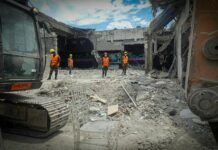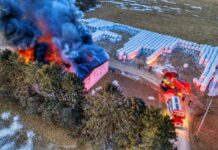
Top 20 Near Miss Reporting Examples & Lessons Learned
Here are 20 real-world near-miss reporting examples along with key lessons learned to improve workplace safety:
1. Slip on a Wet Floor (No Sign Posted)
Near-Miss: An employee nearly slipped on a recently mopped floor with no warning sign.
Lesson Learned: Always place “Wet Floor” signs immediately after cleaning.
2. Falling Tools from Height
Near-Miss: A wrench was dropped from scaffolding but missed workers below.
Lesson Learned: Use tool lanyards and enforce hard hat zones in elevated work areas.
3. Electrical Cord Left Across Walkway
Near-Miss: A tripping hazard was reported before someone fell.
Lesson Learned: Secure cords properly or use cable covers in high-traffic areas.
4. Improperly Stored Chemicals
Near-Miss: Two reactive chemicals were almost mixed due to poor labeling.
Lesson Learned: Follow GHS labeling and store incompatible substances separately.
5. Near-Collision with Forklift
Near-Miss: A pedestrian almost got hit by a forklift in a blind spot.
Lesson Learned: Implement pedestrian-vehicle separation and use spotters.
6. Unguarded Machinery Activation
Near-Miss: A machine almost started during maintenance due to no Lockout/Tagout (LOTO).
Lesson Learned: Strictly enforce LOTO procedures before servicing equipment.
7. Overloaded Shelving
Near-Miss: A warehouse shelf nearly collapsed under excessive weight.
Lesson Learned: Follow load limits and inspect storage systems regularly.
8. Gas Leak Detected Just in Time
Near-Miss: A worker smelled gas before concentrations reached dangerous levels.
Lesson Learned: Install gas detectors and train employees on emergency response.
9. Ladder Instability Incident
Near-Miss: A worker almost fell when a ladder shifted.
Lesson Learned: Always inspect ladders and secure them properly before use.
10. Improper PPE Usage
Near-Miss: A worker nearly suffered eye injury due to missing safety glasses.
Lesson Learned: Enforce PPE compliance through regular checks.
11. Confined Space Entry Without Testing
Near-Miss: A worker entered a tank without checking oxygen levels first.
Lesson Learned: Follow confined space entry permits and atmospheric testing.
12. Fire Extinguisher Blocked
Near-Miss: An emergency exit was obstructed, delaying evacuation.
Lesson Learned: Keep exits and safety equipment clearly accessible.
13. Near-Miss with Falling Debris
Near-Miss: Loose materials on a roof almost fell on workers below.
Lesson Learned: Use toe boards and debris nets in elevated work zones.
14. Incorrect Manual Lifting Technique
Near-Miss: A worker strained their back lifting improperly.
Lesson Learned: Train employees on proper lifting techniques and use mechanical aids.
15. Unmarked Step Hazard
Near-Miss: A worker tripped on an uneven floor transition.
Lesson Learned: Mark elevation changes with high-visibility paint or signage.
16. Near-Electrocution from Damaged Cord
Near-Miss: A frayed power cord nearly caused an electrical shock.
Lesson Learned: Conduct regular equipment inspections and replace damaged cords.
17. Poor Ventilation in Paint Booth
Near-Miss: Fumes built up due to a faulty exhaust system.
Lesson Learned: Maintain ventilation systems and monitor air quality.
18. Incorrectly Secured Load on Truck
Near-Miss: A shifting pallet almost fell during transport.
Lesson Learned: Verify load securement before moving vehicles.
19. Lack of Fall Protection Near Edge
Near-Miss: A worker almost stepped off an unprotected roof edge.
Lesson Learned: Use guardrails or harness systems near fall hazards.
20. Miscommunication During Shift Change
Near-Miss: Critical safety info wasn’t passed to the next shift.
Lesson Learned: Standardize handover procedures to ensure safety continuity.
Key Takeaways:
✅ Report all near-misses—they are free lessons to prevent future accidents.
✅ Encourage a “No Blame” culture to increase reporting.
✅ Investigate root causes rather than just addressing symptoms.
✅ Train employees regularly on hazard recognition and reporting.
By learning from these near-miss examples, organizations can proactively prevent accidents and create a safer workplace.
Classification of Accidents in Safety
























